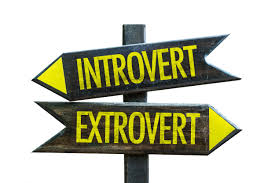 The introvert is the inward-looking person. Introverts prefer a life of contemplation, being alone or with a close friend rather than in a group, and often favor listening rather than talking. They feel ill at ease and even overstimulated when things get too exciting. Introverts may appear calm on the outside, but may feel anxious internally around other people. Even if they enjoy an activity, they need time for rest and regrouping after a while. Introverts don’t like feeling pressured – and they prefer to live according to their own needs rather than the demands of others. When things get to be too stimulating, they might “zone out.”
The introvert is the inward-looking person. Introverts prefer a life of contemplation, being alone or with a close friend rather than in a group, and often favor listening rather than talking. They feel ill at ease and even overstimulated when things get too exciting. Introverts may appear calm on the outside, but may feel anxious internally around other people. Even if they enjoy an activity, they need time for rest and regrouping after a while. Introverts don’t like feeling pressured – and they prefer to live according to their own needs rather than the demands of others. When things get to be too stimulating, they might “zone out.”
Unfortunately, in a world dominated by extroverts, the inward-directed person is described as having a problem. Others see them as aloof, unfriendly, and mysterious. Because they prefer not to engage in typical social aspirations (like aiming for the fast track on the job), they may be called losers – wallflowers, lacking in gumption, loners, self-centered. To make things worse for introverts, they often believe the labels cast upon them and feel there is something wrong with them.
We live in a world of extroverts. Our social norms are geared to people who are “out there” – those who achieve, compete, socialize easily, and are energized by the external world. Society encourages us to describe ourselves in terms of what we see externally and we try to match the models provided for us. Our idea of success is to achieve a life that’s prescribed for us by the social sphere. The extrovert’s idea of happiness is to have lots of friends and to enjoy talking, even when they don’t put much thought into what they say. They like activity and being around excitement. When so much of our attention is directed outwardly, however, we can lose track of our own authentic needs.
Although the introvert may lack qualities valued by many in our society, it helps to understand that the introverted lifestyle is a powerful one. There are positive and negative features associated with both introversion and extroversion. In truth, neither is superior to the other. Our goal might be to identify which describes us better – introvert or extrovert – and to recognize how our particular orientation can serve us best.
